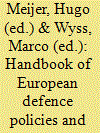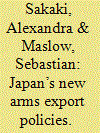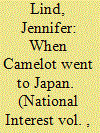|
|
|
Sort Order |
|
|
|
Items / Page
|
|
|
|
|
|
|
| Srl | Item |
| 1 |
ID:
163793


|
|
|
|
|
| Summary/Abstract |
This article explores the efforts of Japan and Australia to enhance the naval
capability of third countries—specifically the Philippines—threatened by the
rise of China. Considered as middle powers, both countries are members of two
associations of maritime democracies, namely: the Democratic Security Diamond
(DSD), and the Quadrilateral Security Dialogue (QUAD). Since the formation
of their special strategic partnership, Japan and Australia have jointly assisted in
building up the capabilities of the Philippine Navy (PN), Philippine Coast Guard
(PCG), and the Philippine Air Force (PAF). The recent dramatic shift in Philippine
foreign policy direction fosters this triangular security relationship. On the one
hand, President Rodrigo Duterte, in distancing the Philippines from the United
States (the country’s traditional ally) favors closer security ties with Japan and
Australia. On the other hand, Japan and Australia want to prevent the Philippines
from gravitating closer to China’s orbit of influence and power. Gradually, however,
this development can either modify or erode the American hub-and-spoke system of
alliance in East Asia and increase the spoke-to-spoke links leading to the creation of
minilateral and plurilateral security arrangements in the Indo–Pacific region.
|
|
|
|
|
|
|
|
|
|
|
|
|
|
|
|
| 2 |
ID:
164514


|
|
|
|
|
| Publication |
Oxford, Oxford University Press, 2018.
|
| Description |
xxxvi, 960p.hbk
|
| Standard Number |
9780198790501
|
|
|
|
|
|
|
|
|
|
|
|
Copies: C:1/I:0,R:0,Q:0
Circulation
| Accession# | Call# | Current Location | Status | Policy | Location |
| 059610 | 355.03354/MEI 059610 | Main | On Shelf | General | |
|
|
|
|
| 3 |
ID:
175660


|
|
|
|
|
| Summary/Abstract |
This article examines the significance of the changes in Japan’s arms export policy following Prime Minister Abe Shinzō’s return to power in 2012—a topic which has so far received insufficient scholarly attention. Established in the 1960s and 1970s, Japan’s ‘virtual’ ban on arms exports was an expression of the country’s postwar anti-militarism. Yet, in keeping with Japan’s increasingly active role in security affairs, Abe lifted the ban on weapons exports in 2014. Within the Ministry of Defense, a new agency was installed to oversee the arms industry and to promote military-related research and weapons transfers. We show that the Abe administration conceives of arms exports and related cooperation as an integral part of its national security strategy. Tokyo not only hopes to improve the competitiveness of its own defence industry, but also seeks to cement existing and new security partnerships while contributing to regional capacity building as a hedge against a rising China. The actual ramifications of this policy change are far from clear yet, however. A major constraint for policymaking is the reluctance of the defence sector to embrace arms export due to the associated business risks including the fear of tarnishing their corporate image.
|
|
|
|
|
|
|
|
|
|
|
|
|
|
|
|
| 4 |
ID:
159420


|
|
|
|
|
| Summary/Abstract |
During the cold war the United States was overwhelmingly central in Japan's security policy. Japan hosted US bases and the Self-Defense Forces held joint exercises with the US military, even while shunning contacts with other militaries. Japan essentially refused even to discuss security with its neighbors. Special exceptions were made for the United States in otherwise sweeping policies, such as the exception for the United States in Tokyo's ban on weapons exports and co-development. Since the end of the cold war, Japan's security policy has undergone a little noticed transformation: it has steadily moved away from being centered on the United States as its sole security partner. Tokyo has initiated bilateral security dialogues with its Asian neighbors and assumed a leadership role in promoting regional multilateral security cooperation as a supplement to the US alliance. Japan has begun building bilateral security partnerships with a range of countries and actors, from Australia and India to the European Union. Paradoxically these changes have occurred even as the US–Japan alliance has strengthened. The articles in this special issue examine these new security ties with states and multilateral organizations, and other changes in policy that have made the United States less ‘special,’ such as by allowing arms exports to other actors.
|
|
|
|
|
|
|
|
|
|
|
|
|
|
|
|
| 5 |
ID:
193232


|
|
|
|
|
| Summary/Abstract |
Security partnerships between unequal partners walk a fine line between mutually beneficial cooperation and coercion. This article theorizes resource provision in security partnerships in which a funder substantively supports a recipient organization. Specifically, I develop an argument concerning the effect of principal–agent interactions in security partnerships on the recipient’s agency through mechanisms of agenda-setting and capacity-building. The European Union’s (EU) peace and security partnership with the African Union (AU) illustrates the contentious politics of resource mobilization in security partnerships, and how these politics affect the secretariat of the recipient organization. The article arrives at the rather optimistic conclusion that the EU is a generous partner with an explicit goal of cooperative engagement. Furthermore, opportunities for coercion are minimized by the EU’s internal bureaucratic obstacles, the AU’s strategic sequencing of the resource mobilization process, and the overarching post-coloniality of the partnership. However, occasional episodes of coercive EU behaviour have led to considerable tensions in the partnership. These findings add important contrast to postcolonial critiques of AU funding: the AU Commission exercises considerable organizational agency, which relegates the EU – despite being a large payer – to the role of a small player, particularly when it comes to directly influencing the AU.
|
|
|
|
|
|
|
|
|
|
|
|
|
|
|
|
| 6 |
ID:
121977


|
|
|
| 7 |
ID:
121575


|
|
|
|
|
| Publication |
2013.
|
| Summary/Abstract |
THE UNITED States has security partnerships with numerous countries whose people detest America. The United States and Pakistan wrangled for seven months over a U.S. apology for the NATO air strikes that killed twenty-four Pakistani soldiers in 2011. The accompanying protests that roiled Islamabad, Karachi and other cities are a staple of the two countries' fraught relationship. Similarly, American relations with Afghanistan repeatedly descended into turmoil last year as Afghans expressed outrage at Koran burnings by U.S. personnel through riots and killings. "Green on blue" attacks-Afghan killings of U.S. soldiers-plague the alliance. In many Islamic countries, polls reflect little warmth toward Americans.
|
|
|
|
|
|
|
|
|
|
|
|
|
|
|
|
|
|
|
|
|